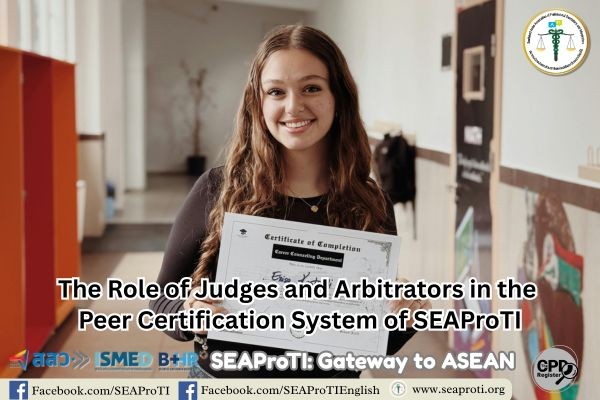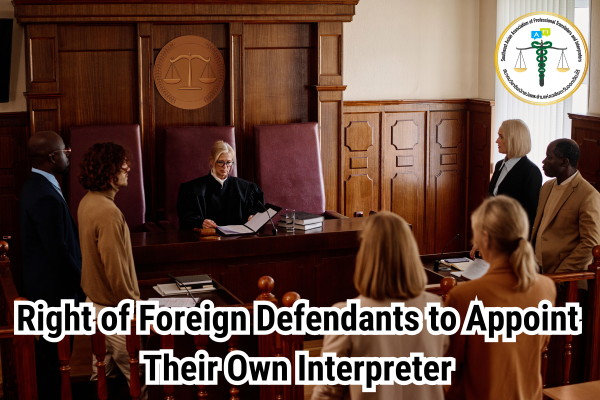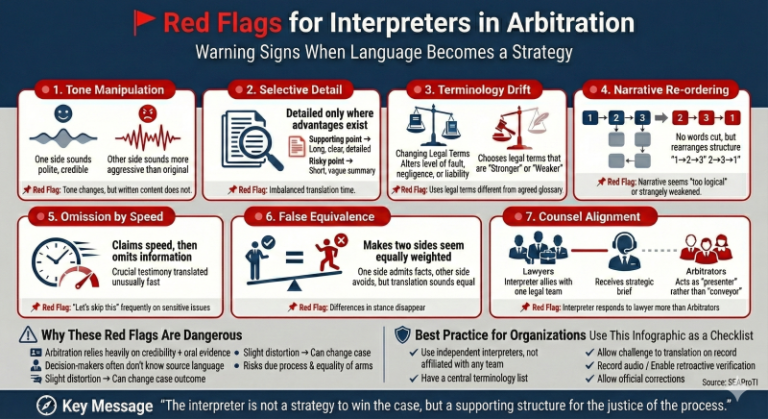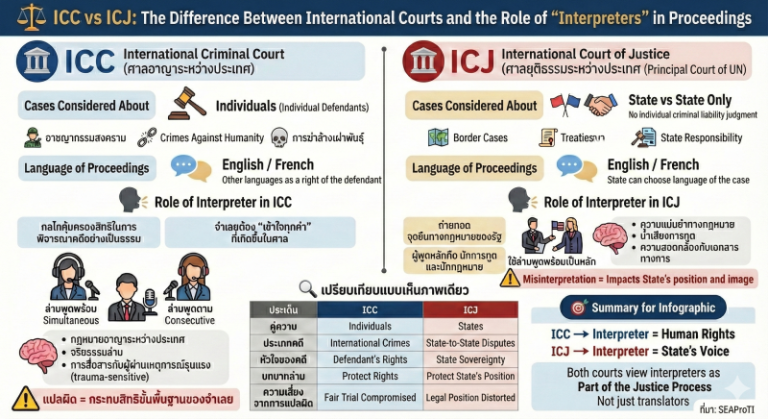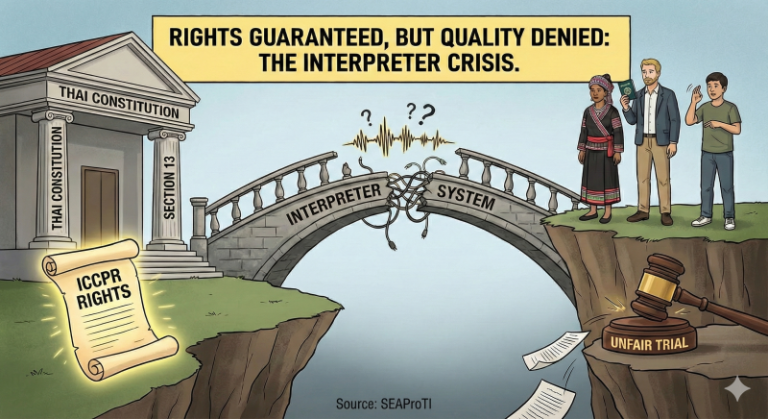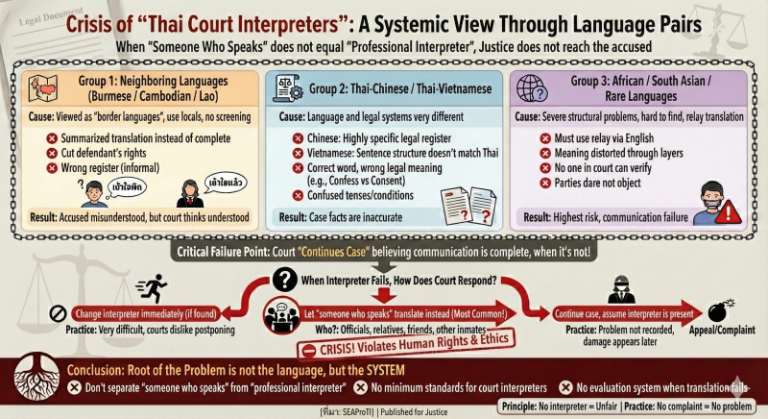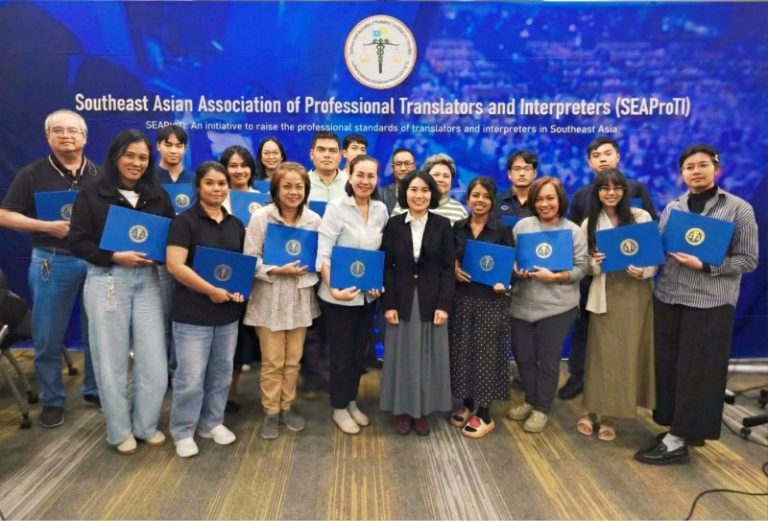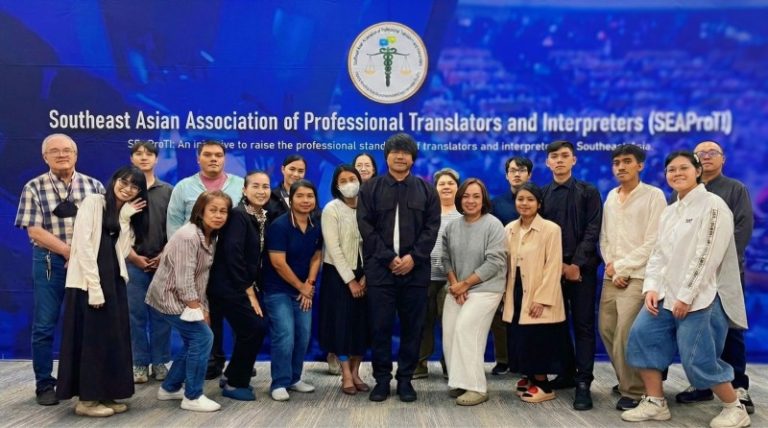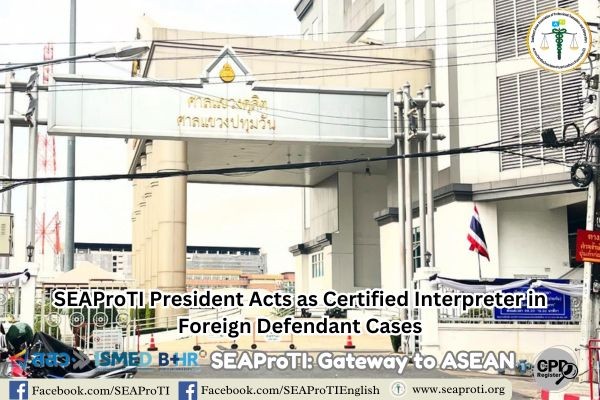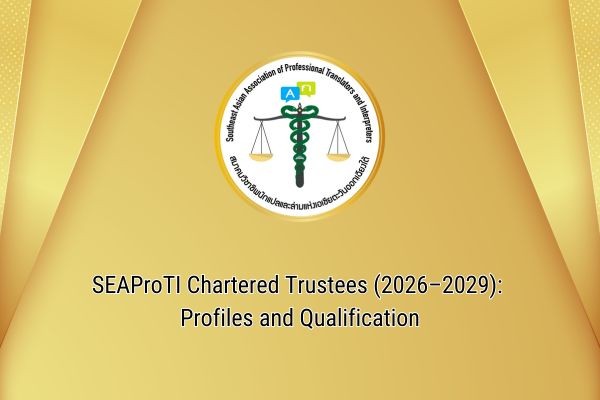The Role of Judges and Arbitrators in the Peer Certification System of
the Southeast Asian Association of Professional Translators and Interpreters
October 15, 2025, Bangkok — This article explains the rationale and professional principles behind the involvement of judges and arbitrators in the qualification certification process for Certified Translators, Translation Certification Providers, and Certified Interpreters under the “Peer Certification System” of the Southeast Asian Association of Professional Translators and Interpreters (SEAProTI). The system aims to elevate the professional standards of translators and interpreters toward fairness, transparency, and recognition at both legal and international levels.
In the context of justice and international communication, translation and interpreting play a crucial role in influencing the rights, duties, and legal outcomes of parties. Establishing a certification system for translators and interpreters that is widely recognized requires more than linguistic evaluation—it must also integrate ethical and legal standards (González et al., 2012).
SEAProTI has therefore incorporated judges and arbitrators as part of the qualification assessment panel to ensure that certified practitioners possess both linguistic proficiency and an understanding of the legal implications of their translation or interpreting work.
Legal Credibility
The participation of judges and arbitrators in the certification system reflects the principle of legal credibility, as translated materials are frequently used in courts and dispute resolution proceedings (Hale, 2015).
Certification granted by highly experienced legal professionals—such as judges and arbitrators—adds evidentiary weight to translated documents submitted to courts, thereby increasing confidence among contracting parties and government agencies that the translations are accurate and faithful to the intent of the law.
The Principle of “Peer Certification”
The Peer Certification System is designed to ensure that assessors possess equivalent or directly relevant expertise to the field being evaluated (Pöchhacker, 2016). In legal translation and court interpreting, individuals with legal expertise—such as judges and arbitrators—serve as legal contextual peers. They are capable of assessing not only linguistic accuracy but also substantive fidelity and ethical appropriateness in the language used within judicial or quasi-judicial contexts.
Transparency and Checks and Balances
Having judges and arbitrators as members of the certification committee also functions as a mechanism of checks and balances. This arrangement minimizes the risk of bias within the profession and reinforces an independent and impartial evaluation process (Chesterman, 2009). The result is a certification system that commands higher credibility and is internationally reliable.
Elevating Translators and Interpreters as “Officers of the Justice System”
Translators and interpreters—particularly those working in legal settings—are not merely language practitioners but officers of the justice system. Certification endorsed by judges and arbitrators helps instill a sense of responsibility for the legal consequences of one’s linguistic output and strengthens the professional image of translators and interpreters as counterparts to legal professionals (Mikkelson & Jourdenais, 2015).
Conclusion
The inclusion of judges and arbitrators in SEAProTI’s certification process represents a strategic policy decision affirming that certification is not based solely on linguistic competence, but also on legal and ethical credibility. This integration of linguistics and law establishes SEAProTI as a regional model for professional translator and interpreter certification—anchored in justice, transparency, and ethical integrity.
References
- Chesterman, A. (2009). The ethics of translation. In J. Munday (Ed.), The Routledge companion to translation studies (pp. 147–160). Routledge.
- González, R. D., Vásquez, V. F., & Mikkelson, H. (2012). Fundamentals of court interpretation: Theory, policy and practice (2nd ed.). Carolina Academic Press.
- Hale, S. (2015). Community interpreting. Palgrave Macmillan.
- Mikkelson, H., & Jourdenais, R. (Eds.). (2015). The Routledge handbook of interpreting. Routledge.
- Pöchhacker, F. (2016). Introducing interpreting studies (2nd ed.). Routledge.
About Certified Translators, Translation Certifiers, and Certified Interpreters of SEAProTI
The Southeast Asian Association of Professional Translators and Interpreters (SEAProTI) has formally announced the qualifications and requirements for registration of Certified Translators, Translation Certification Providers, and Certified Interpreters in Sections 9 and 10 of the Royal Gazette, published by the Secretariat of the Cabinet, Office of the Prime Minister of Thailand, on 25 July 2024 (Vol. 141, Part 66 Ng, p. 100). Certified Translators, Translation Certification Providers, and Certified Interpreters
The Council of State has proposed the enactment of a Royal Decree, granting registered translators and recognized translation certifiers from professional associations or accredited language institutions the authority to provide legally valid translation certification (Letter to SEAProTI dated April 28, 2025)
SEAProTI is the first professional association in Thailand and Southeast Asia to implement a comprehensive certification system for translators, certifiers, and interpreters.
Head Office: Baan Ratchakru Building, No. 33, Room 402, Soi Phahonyothin 5, Phahonyothin Road, Phaya Thai District, Bangkok 10400, Thailand
Email: hello@seaproti.com | Tel.: (+66) 2-114-3128 (Office hours: Mon–Fri, 09:00–17:00)
เหตุผลในการมีผู้พิพากษาและอนุญาโตตุลาการร่วมในระบบรับรองนักแปลและล่ามของสมาคมวิชาชีพนักแปลและล่ามแห่งเอเชียตะวันออกเฉียงใต้
15 ตุลาคม 2568, กรุงเทพมหานคร – บทความนี้มุ่งอธิบายเหตุผลและหลักการเชิงวิชาชีพที่สมาคมวิชาชีพนักแปลและล่ามแห่งเอเชียตะวันออกเฉียงใต้ (Southeast Asian Association of Professional Translators and Interpreters: SEAProTI) นำผู้พิพากษาและอนุญาโตตุลาการเข้ามามีบทบาทในกระบวนการรับรองคุณสมบัติของนักแปลรับรอง ผู้รับรองการแปล และล่ามรับรอง ตามระบบ “การรับรองโดยผู้ที่มีความรู้เสมอกัน” (Peer Certification System) ซึ่งเป็นระบบที่มุ่งยกระดับมาตรฐานวิชาชีพสู่ความเที่ยงธรรม โปร่งใส และได้รับการยอมรับในระดับกฎหมายและนานาชาติ
ในกระบวนการยุติธรรมและการสื่อสารระหว่างประเทศ การแปลและการล่ามถือเป็นส่วนสำคัญที่ส่งผลโดยตรงต่อสิทธิ หน้าที่ และผลทางกฎหมายของคู่สัญญา การสร้างระบบรับรองนักแปลและล่ามที่ได้รับการยอมรับจึงไม่อาจพิจารณาเฉพาะมิติทางภาษาศาสตร์เท่านั้น แต่ต้องเชื่อมโยงกับมาตรฐานทางจริยธรรมและกฎหมาย (González et al., 2012)
สมาคม SEAProTI จึงได้กำหนดให้มีผู้พิพากษาและอนุญาโตตุลาการเข้ามามีส่วนร่วมในการประเมินคุณสมบัติของผู้สมัคร เพื่อยืนยันว่าผู้ได้รับการรับรองมีความเข้าใจทั้งด้านภาษาและผลทางกฎหมายที่เกี่ยวข้องกับผลงานการแปลและการล่ามของตน
การให้ผู้พิพากษาและอนุญาโตตุลาการมีส่วนร่วมในระบบรับรองสะท้อนถึงหลักการ “ความน่าเชื่อถือทางกฎหมาย” (Legal Credibility) เพราะผลงานแปลจำนวนมากถูกนำไปใช้ในศาลและกระบวนการระงับข้อพิพาท (Hale, 2015)
การรับรองจากบุคคลที่มีประสบการณ์ทางกฎหมายสูง เช่น ผู้พิพากษาและอนุญาโตตุลาการ ช่วยสร้างน้ำหนักให้กับเอกสารแปลที่นำเสนอในชั้นศาล เพิ่มความมั่นใจให้กับคู่สัญญาและหน่วยงานของรัฐว่าการแปลดังกล่าวมีความถูกต้องตามเจตนารมณ์ของกฎหมาย
หลักการ “การรับรองโดยผู้ที่มีความรู้เสมอกัน” (Peer Certification)
ระบบ Peer Certification มุ่งหมายให้ผู้ประเมินมีความรู้เทียบเท่าหรือเกี่ยวข้องโดยตรงกับสาขาที่ประเมิน (Pöchhacker, 2016) สำหรับงานแปลเชิงกฎหมายหรือการล่ามในศาล บุคคลที่มีความรู้ทางกฎหมาย เช่น ผู้พิพากษาและอนุญาโตตุลาการ ย่อมเป็นผู้มีความรู้เสมอกันในเชิง “บริบทกฎหมาย” (Legal Contextual Peers) ซึ่งสามารถประเมินได้ทั้งความถูกต้องทางภาษา ความเที่ยงตรงของเนื้อหา และความเหมาะสมทางจริยธรรมของการใช้ภาษาในกระบวนการยุติธรรม
ความโปร่งใสและกลไกถ่วงดุล
การมีผู้พิพากษาและอนุญาโตตุลาการในคณะผู้ประเมินยังทำหน้าที่เป็น “กลไกตรวจสอบและถ่วงดุล” (Checks and Balances) ของระบบรับรอง ซึ่งช่วยลดความลำเอียงภายในวงวิชาชีพเดียวกัน และสร้างกระบวนการประเมินที่ยึดหลักความเป็นอิสระและความเที่ยงธรรม (Chesterman, 2009) ผลลัพธ์คือการรับรองที่มีความน่าเชื่อถือสูง และสามารถอ้างอิงได้ในระดับสากล
นักแปลและล่าม โดยเฉพาะในสาขากฎหมาย มิได้เป็นเพียงผู้ใช้ภาษา แต่เป็น “ผู้ปฏิบัติงานในกระบวนการยุติธรรม” (Officers of the Justice System) การรับรองโดยผู้พิพากษาและอนุญาโตตุลาการจึงทำหน้าที่ปลูกฝังจิตสำนึกในความรับผิดชอบต่อผลทางกฎหมายของคำพูดหรือถ้อยคำที่ถ่ายทอด ตลอดจนยกระดับภาพลักษณ์ของวิชาชีพให้มีฐานะเทียบเท่าวิชาชีพกฎหมาย (Mikkelson & Jourdenais, 2015)
สรุป
การมีผู้พิพากษาและอนุญาโตตุลาการร่วมในกระบวนการรับรองของ SEAProTI จึงเป็นกลยุทธ์เชิงนโยบายที่สำคัญ เพื่อยืนยันว่าการรับรองมิได้อิงเพียง “ความสามารถทางภาษา” แต่เป็นการรับรอง “ความน่าเชื่อถือเชิงกฎหมายและจริยธรรมวิชาชีพ” โดยแท้จริง การเชื่อมโยงวิชาภาษาศาสตร์กับวิชากฎหมายอย่างกลมกลืนนี้จะช่วยผลักดันให้สมาคมฯ กลายเป็นต้นแบบระดับภูมิภาคในด้านการรับรองวิชาชีพนักแปลและล่าม
บรรณานุกรม
- Chesterman, A. (2009). The ethics of translation. In J. Munday (Ed.), The Routledge companion to translation studies (pp. 147–160). Routledge.
- González, R. D., Vásquez, V. F., & Mikkelson, H. (2012). Fundamentals of court interpretation: Theory, policy and practice (2nd ed.). Carolina Academic Press.
- Hale, S. (2015). Community interpreting. Palgrave Macmillan.
- Mikkelson, H., & Jourdenais, R. (Eds.). (2015). The Routledge handbook of interpreting. Routledge.
- Pöchhacker, F. (2016). Introducing interpreting studies (2nd ed.). Routledge.
สมาคมวิชาชีพนักแปลและล่ามแห่งเอเชียตะวันออกเฉียงใต้ (SEAProTI) ได้ประกาศหลักเกณฑ์และคุณสมบัติผู้ที่ขึ้นทะเบียนเป็น “นักแปลรับรอง (Certified Translators) และผู้รับรองการแปล (Translation Certification Providers) และล่ามรับรอง (Certified Interpreters)” ของสมาคม หมวดที่ 9 และหมวดที่ 10 ในราชกิจจานุเบกษา ของสำนักเลขาธิการคณะรัฐมนตรี ในสำนักนายกรัฐมนตรี แห่งราชอาณาจักรไทย ลงวันที่ 25 ก.ค. 2567 เล่มที่ 141 ตอนที่ 66 ง หน้า 100 อ่านฉบับเต็มได้ที่: นักแปลรับรอง ผู้รับรองการแปล และล่ามรับรอง
สำนักคณะกรรมการกฤษฎีกาเสนอให้ตราเป็นพระราชกฤษฎีกา โดยกำหนดให้นักแปลที่ขึ้นทะเบียน รวมถึงผู้รับรองการแปลจากสมาคมวิชาชีพหรือสถาบันสอนภาษาที่มีการอบรมและขึ้นทะเบียน สามารถรับรองคำแปลได้ (จดหมายถึงสมาคม SEAProTI ลงวันที่ 28 เม.ย. 2568)
สมาคมวิชาชีพนักแปลและล่ามแห่งเอเชียตะวันออกเฉียงใต้ เป็นสมาคมวิชาชีพแห่งแรกในประเทศไทยและภูมิภาคเอเชียตะวันออกเฉียงใต้ที่มีระบบรับรองนักแปลรับรอง ผู้รับรองการแปล และล่ามรับรอง
สำนักงานใหญ่: อาคารบ้านราชครู เลขที่ 33 ห้อง 402 ซอยพหลโยธิน 5 ถนนพหลโยธิน แขวงพญาไท เขตพญาไท กรุงเทพมหานคร 10400 ประเทศไทย
อีเมล: hello@seaproti.com โทรศัพท์: (+66) 2-114-3128 (เวลาทำการ: วันจันทร์–วันศุกร์ เวลา 09.00–17.00 น.)


